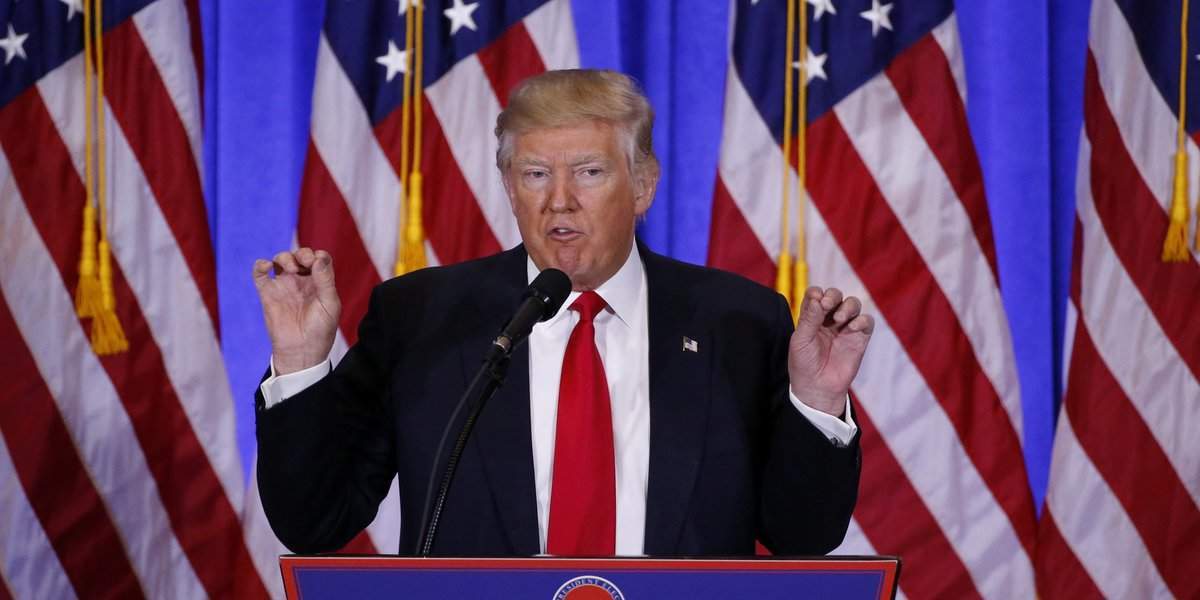
These three things are going to have a significant impact on the wider world.
Trump disregards conflict of interest claims
Walter Shaub, director of the US Office of Government Ethics has criticised Donald Trump’s plan to hand control of his business empire to his sons, Donald Jr and Eric Trump. Trump, who will be sworn in as US president next week, insisted that he would ignore demands from the ethics watchdog to divest himself of his business empire.
“Stepping back from running his business is meaningless from a conflict of interest perspective,” said Shaub. “This is not a blind trust. It’s not even close.”
Trump also hit back at allegations in a leaked dossier that he colluded with Russia to win the US presidential election and engaged in lurid sex acts in a Moscow hotel.
At his first press conference on Wednesday in New York, the president-elect denied the unverified claims made against him in the 35-page dossier, written by former British intelligence officer Christopher Steele.
Russia has never tried to use leverage over me. I HAVE NOTHING TO DO WITH RUSSIA – NO DEALS, NO LOANS, NO NOTHING!
How well do you really know your competitors?
Access the most comprehensive Company Profiles on the market, powered by GlobalData. Save hours of research. Gain competitive edge.
 Company Profile – free sample
Company Profile – free sampleThank you!
Your download email will arrive shortly
Not ready to buy yet? Download a free sample
We are confident about the unique quality of our Company Profiles. However, we want you to make the most beneficial decision for your business, so we offer a free sample that you can download by submitting the below form
By GlobalData— Donald J. Trump (@realDonaldTrump) 11 January 2017
Trump accused US intelligence chiefs of “acting like Nazis” by letting classified information into the public domain.
Trump accuses U.S. spy agencies of ‘Nazi’ tactics over over ‘phony’ Russia dossier. Read more: https://t.co/Ap2342qufQ pic.twitter.com/EeGNP13Nyr
— Reuters Top News (@Reuters) 11 January 2017
However, James Clapper, the US director of intelligence, rejected Trump’s suggestion that the country’s spies had anything to do with the leak, saying that he was “profoundly dismayed” that the report had been made public.
“I think it was disgraceful that the intelligence agencies allowed any information that turned out to be so false and fake out. I think it’s a disgrace. That’s something that Nazi Germany would have done, and did do,” said Trump.
CNN first reported the accusations on Tuesday, and later that evening Buzzfeed published the full dossier. At his press conference the following day, Trump called Buzzfeed a “failing pile of garbage” and angrily refused to take a question from a CNN reporter.
We had a great News Conference at Trump Tower today. A couple of FAKE NEWS organizations were there but the people truly get what’s going on
— Donald J. Trump (@realDonaldTrump) 12 January 2017
Fearing a backlash against him, Steele is now “in hiding” according to BBC News.
Hope for Cyprus peace talks
Today, Britain’s foreign secretary, Boris Johnson will join leading politicians from Greece and Turkey in Geneva, Switzerland in an effort to bring peace to Cyprus, reuniting the divided island.
There is a long history of tension between Greek and Turkish communities living in Cyprus, both with strong nationalist sentiments.
Turkish troops invaded Cyprus in 1974 following a coup by Greek Cypriots.
After more than four decades of division, the United Nations (UN), overseeing the negotiations, hopes an agreement for a two-state federation can be reached.
Turkey’s prime minister Binali Yildirim’s attendance has been hailed as a sign that the talks are being taken seriously.
“The UK fully supports the settlement process and is ready and willing to help in any way it can,” Johnson said ahead of his arrival.
“I hope that all those involved will approach the talks with a sense of openness and flexibility. I believe that if approached in this light, a solution is in reach to bring lasting peace to Cyprus.”
Lobby group pushes for trade deal post-Brexit
TheCityUK, Britain’s most powerful financial lobby group published a two-page document today, calling for a “bespoke agreement” between the UK and the EU “that delivers mutual market access, transitional arrangements to allow for enough time to implement the new relationship and access to talent.”
However, the group accepts that it would be unrealistic to expect full passporting rights after Brexit, allowing financial companies in the UK to sell all their services across the 28-nation bloc.
“I am confident that this represents in broad shape the key priorities for the industry,” TheCityUK CEO Miles Celic told Reuters.
“There are a multiple number of documents out there of stuff at significant length. So there was a sense among our membership to filter down what the key asks were into a single place.”
Theresa May has said she intends to trigger Article 50, Britain’s official exit clause from the EU, by the end of March.







